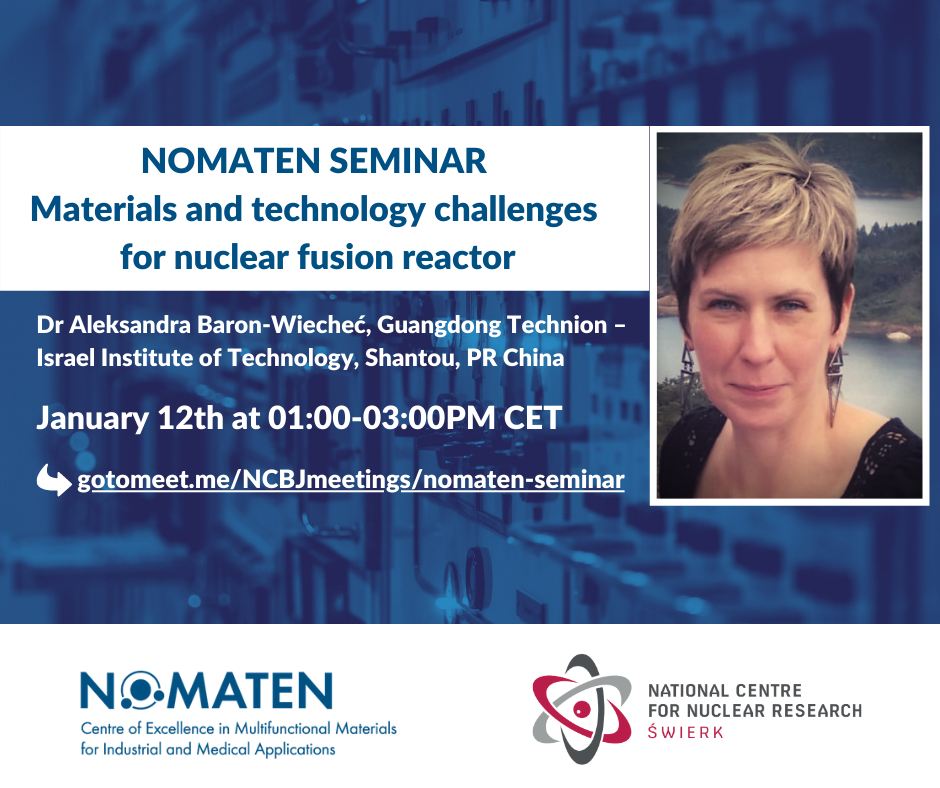NOMATEN Webinar on January 12th at 1:00PM CET: Materials and technology challenges for nuclear fusion reactor

Materials and technology challenges for nuclear fusion reactor
Our current energy landscape is heavily dependent on the fast-depleting fossil fuels, changing this dependence is critical to cut down on the greenhouse gas emissions. One of the future solution for energy source problems is a nuclear fusion process. Nuclear fusion is the same process that powers stars and our Sun. The technological challenges of bringing fusion power to the electricity grid will be addressed by a DEMO-type reactor. The design for the demonstration fusion power plant (DEMO) utilizes the tokamak concept, in which a burning plasma is contained in a torus-shaped vacuum vessel. The fuel – a mixture of Deuterium and Tritium – is heated to temperatures in excess of 150 million °C, forming hot plasma. Strong magnetic fields keep the plasma away from the walls.
Fusion reactors experience many commonalities with advanced fission reactors and high power accelerator spallation targets. The operational requirements of the structural materials in fusion power plants are beyond today’s experience. This includes elevated operating temperature, cyclic operation with long hold time, prolonged periods of operation, steep temperature and stress gradients, high neutron irradiation damage and a very high production rates of helium and hydrogen as well as corrosion. Databases supporting mathematical models and designs of future fusion power plant are mainly derived from relatively few tests facilities. Individual countries are exploring ways to facilitate a faster research and technology development and share information in large collaborative programs. For example studies of H isotopes retention (also referred to as “fuel retention”) in Plasma Facing Components (PFC) are carried at the currently world’s largest nuclear fusion experimental reactor JET (Joint European Torus) as a part of the international effort under EUROFusion consortium agreement.
The main goal of this talk is to present the tokamak fusion device concept, illustrated by an overview of JET, and to discuss selected challenges of nuclear fusion technology, such as PFC fuel retention and magnetic-field assisted corrosion.
About dr Aleksandra Baron-Wiecheć, Assistant Professor at Guangdong Technion – Israel Institute of Technology, Shantou - CHINA
Aleksandra Baron-Wiechec is an assistant professor and research group leader at Guangdong Technion – Israel Institute of Technology. She received her PhD from the Silesian University of Technology in Poland. In 2007 she was awarded with a highly prestigious Marie Curie Intra European Fellowship and moved to University of Manchester (UK) to conduct her research on nucleation and growth mechanism of nanometric porous oxides on light metals, in close collaboration between Manchester and the Institute des NanoScience in Paris (France). In 2012 she took up a permanent position at the UK Atomic Energy Authority working at the world’s largest nuclear fusion reactor JET (Joint European Torus) as a materials/surface scientist, where she contributed to the understanding various aspects of hydrogen isotopes retention in the structural materials and plasma-facing components of experimental fusion reactors.
Years of experience working in complex environments, comprehensive hands-on experience in materials science, surface analysis and corrosion, and great scientific passion encourage her to joint Guangdong Technion, a new sino-foreign cooperative institution established by the Technion, Li Ka Shing Foundation and Guangdong Province. Since November 2018 she has been building the Baron Lab. Her research group, although very young, has already attracted highly talented post-doctoral scientists, research assistants, and a warm interest from many students and science enthusiasts in China and abroad.
Today her research centres around functionalization of metals surface, stable isotopes application in materials science and nuclear fusion technology. Aleksandra has attracted many millions of USD in research and commercial funding as a principal investigator and a collaborator, she published research outcomes in over 90 peer review papers and conference proceedings, she was invited to present her research at conferences and universities in the USA, Mexico, China, Japan, and in many places across Europe. She is an active member of the EU Alumni initiative of the European Delegation in Beijing and a big fan and friend of NOMATEN Centre of Excellence in Poland.
She also bakes the best fruitcake in the Greater Bay Area ;-)






